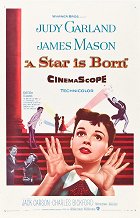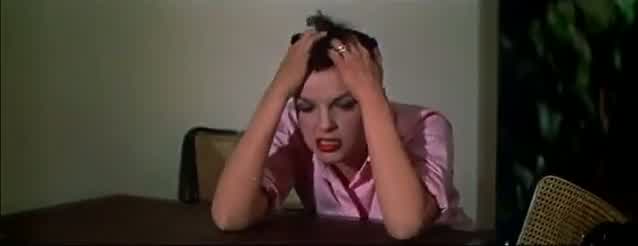Réalisation:
George CukorPhotographie:
Sam LeavittMusique:
Ray HeindorfActeurs·trices:
Judy Garland, James Mason, Jack Carson, Charles Bickford, Tommy Noonan, Lucy Marlow, Amanda Blake, Carey Loftin, Strother Martin, Barry Norton (plus)Résumés(1)
Alors qu’il se présente ivre à un gala, Norman Maine, un acteur sur le déclin, fait la rencontre d’Esther, une jeune femme rêvant d’Hollywood. Tous deux ne tardent pas à former un couple et à se tirer mutuellement vers le haut. En effet, tandis que Norman lance la carrière d’Esther, celle-ci lui donne le courage d’arrêter l’alcool. Esther devient bientôt une actrice au firmament de la gloire et s’apprête à décrocher un Oscar. Mais Norman, désormais fini dans le milieu du cinéma, sombre dans la dépression. (LaCinetek)
(plus)Vidéo (1)
Critiques (2)
I thought that the combination of Judy Garland and James Mason couldn't work, but it worked perfectly. James Mason reassured me once again that he is one of the greatest actors who have ever walked the screen, even though he can sometimes be quite theatrical. It doesn't bother me at all, and with these two actors, you will definitely enjoy this almost three-hour musical opus.
()
Years later, Judy again realises that she isn’t in Kansas anymore. And in that realisation, there is much more bitterness than before. Where the caustic nature of the self-reflexive moments is concerned, Cukor’s film doesn’t go into much depth, as it too faithfully copies the proven melodramatic formula involving a woman consumed by her conflicted relationship with the man who gave her strength and then took it away from her. Furthermore, the preparation of the groundwork for the final role reversal (after Vicki outgrows Norman, she takes charge of him) is needlessly drawn out. Regardless of how great the songs are, they enrich the narrative and have a certain reach beyond the film (the longest song, an exhibition of the stereotypical roles that the entertainment industry assigns to women, aptly identifies what both the film’s Vicki and Garland herself went through on their way to stardom). However, the trading in human identities, which become commercial goods in Hollywood, is aptly depicted. Image makers are not interested in the whole woman, but only in her individual parts, which they try to standardise in the interest of easier monetisation, thus making her similar to existing products by making her a copy of copies (Dietrich’s eyebrows, Crawford’s mouth). As a celebrity, she ceases to be herself and ceases to be for herself. She becomes public property. I would venture to say that Cukor’s callous calculation of the price of fame is even more accurate today than it was sixty years ago. 80%
()



Annonces